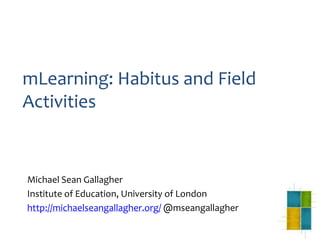
Habitus and Field Activities with Mobile Learning
- 1. mLearning: Habitus and Field Activities Michael Sean Gallagher Institute of Education, University of London http://michaelseangallagher.org/ @mseangallagher
- 2. What is mlearning? “tools such as computers and mobile phones function as interactive agents in the process of coming to know, creating a human-technology system to communicate, to mediate agreements between learners and to aid recall and reflection” (Sharples, 2005, 7)
- 3. What is Mlearning? Technology includes (but not limited to): Tablets Phones GPS devices MP3 Players Laptops * * Criteria for inclusion: Does the technology transform the habitus?
- 4. What is Mlearning? Habitus: a structure of the mind characterized by a set of acquired schemata, sensibilities, dispositions and taste. “That which is mobile is not knowledge or information, but is the individual’s habitus.” (Kress, Pachler)
- 5. What is mlearning? “the ability to bring things into conjunction which might have previously have been relatively difficult to join” (Kress, Pachler)
- 6. Mlearning for General Education Content Access Literacy Assessment News Administration Collaboration Composition/Curation
- 7. Mlearning for Primary Education • Writing • Mathematics • Reading • Media Creation/Curation • Reflection/Composition * • Assessment • Administration • Collaboration
- 8. Mlearning for Secondary Education Access/Administration Literacy/Numeracy Discipline specific investigations Field Activities Media Creation/Curation Reflection/Composition * Test Preparation Collaboration “For the things we have to learn before we can do them, we learn by doing them.” ― Aristotle
- 9. Mlearning for Higher Education Access/Administration Data Collection/Field Activities Media Creation/Curation Composition/Reflection Data Management Collaboration Dissemination
- 10. mLearning for Developing Nations m4d Literacy Agriculture Health Governance Disaster Response and Relief Learning Finance (M-Pesa)
- 11. Scope and Significance New modes for new media and theoretical positions New methods of selection New mechanisms for demonstrating knowledge Reinvestment in the local and the geographical All require reflective activities
- 12. Multimodality First, multimodality assumes that representation and communication always draw on a multiplicity of modes, all of which contribute to meaning Second, multimodality assumes that resources are socially shaped over time to become meaning making resources that articulate the meanings demanded by different communities. Third, people orchestrate meaning through their selection and configuration of modes *Taken from MODE Multimodality Glossary
- 13. Multimodality & Mobile: For Learners What media/modes are you including? Why? What is their social significance (to the discipline, classmates, society)? How will they be arranged/orchestrated? Why did you choose this layout? What does it emphasize or foreground? What is your position (theory, opinion, thesis)? How is your position linked to your composition? What tools and technologies will you use to present this? * Reflection=Evidence of Learning
- 14. Composing w/mobile: Sequence 1. Research questions 2. Theoretical positioning 3. Methods of selection (media, theory, modes, tools) 4. Layout/Design 5. Tools * 6. Workflow/Timeline 7. Data collection and curation 8. Field Notes 9. Analysis, Assembly and Reflection 10. Dissemination *never forget data management
- 15. Presentation of Meaning ‘Containers’ for mobile Montage Collage Mosaic Maps (GPS) Remixes Mashups Blog posts “…completely at odds with our modern visual experience, because everything today is based on montage”- Esa-Pekka Salonen
- 16. Mobile Tools for Composition My Mobile Toolkit
- 17. Mobile Field Diaries “I never travel without my diary. One should always have something sensational to read in the train”-Oscar Wilde
- 18. Mobile Vantage Points: Place 1. Choose a research question (what do you want to know?) 2. Research that question (person, locale, street, idea) 3. Choose media to collect and tell the story 4. Choose a vantage point from which to explore the place 1. Individual (personal history, famous artist, past civilization) 2. Idea, artwork, or architecture 3. Neighborhood, street, environment (aural, visual, sensory landscapes) 5. Collect Data and Reflect in Field Diaries
- 21. Mobile Composition Examples New York
- 22. Mobile Composition Examples Helsinki Image from KFP
- 23. Mobile Field Activities Helsinki What fields or fields of study (art, literature, history, architecture, biology, botany)? What vantage point (person, neighborhood, idea, architecture, etc.)? What do we want to know (research questions)? What media would tell that story? What data do we need to collect? What tools will we use? Image from Axilera
- 24. Before the Field Diaries: Questions Tools Have you tested the tools? Where is the data stored? Can you export the data? Does it have location (GPS) coordinates? Storage and Presentation Where will this media be collected and composed? Where will it be presented? Blog? Private vs. public? How will others interact with your presentation? Blog comments?
- 25. Field Diaries: Questions Reflective What inspired you to collect this data at this location? What does it mean to you? How does it advance your research question? How would I assess work created this way? Practical What difficulties did you experience collecting the data? What tools might have better served your needs? How are you going to disseminate this media?
- 26. Post-Field Diaries: Questions What media will I use to present my composition? What will I foreground? Background? What tools will I use to assemble this composition? How will I disseminate it?
- 27. mLearning: Habitus and Field Activities Michael Sean Gallagher Institute of Education, University of London http://michaelseangallagher.org/ @mseangallagher
